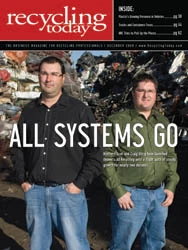On April 28, 2009, Recycling Today convened nine scrap industry veterans for a discussion called the Heritage Roundtable. The event, sponsored by Metso Recycling, was held at the Mandalay Bay Resort & Casino during the 2009 Annual Convention of the Institute of Scrap Recycling Industries Inc.
Moderators Brian Taylor and Jim Keefe of Recycling Today asked the assembled panel to consider several aspects of how the industry had changed and how they might advise those in scrap industry leadership positions today and those who will be in the future. The participants were:
• Richard Abrams, Consolidated Scrap Resources, York, Pa.
• Yale Dorfman, State Metal Industries, Camden, N.J.
• Irving Ehrenhaus, Glenrich Metals, Forest Hills, N.Y.
• Kalman Gordon, L. Gordon Iron & Metal Co., Statesville, N.C.
• Harry Kletter, ISA Inc., Louisville, Ky.,
• Stanley Kramer, Kramer Metals Inc., Los Angeles
• Ira Moskowitz, Moskowitz Bros. Inc., Cincinnati
• Stanton Moss, Stanton A. Moss Inc., Bryn Mawr, Pa.
• Larry Sax, Recycling Today Global Edition, contributing editor and retired nonferrous scrap trader.
Recycling Today: How has the scrap industry business model changed during your years of involvement in the industry? Is the model still rooted in family ownership?
Stanton Moss: One of the problems some of these big consolidated companies have is that they’re being run by professionals who are not scrap people. They don’t have the feel of a scrap processor—a scrap processor who has grown up in the business and who knows the feel of a piece of scrap steel or aluminum. So many of the consolidators over the past number of years—starting with Diversified Metals 30 years ago or Recycling Industries Inc. last decade—where are they? They’re gone.
Irving Ehrenhaus: I have thought long and hard about whether I should bring one of my children into the business. But look at what has happened [to so many of] the trading companies—they’re gone. The margins did not allow them to stay in business, especially if they had Park Avenue offices with overhead. Whether we want to admit it or not, there are buyers, especially in Asia, that are cutting out the middleman. I fume when commercials make fun of the middleman—that’s me!
Ira Moskowitz: There have been trends such as auctioning scrap over the Internet. That’s a very impersonal way to trade. I’m not sure any of it replaces close, careful small business management.
Stanley Kramer: Looking at the people sitting around this table, I would say all of our grandparents came from somewhere other than the United States. They were Jewish people who built businesses around garbage and rags and scrap material out of necessity. The scrap industry in my entire life has always been more of a family business and, despite many changes, that’s what it still is.

Explore the December 2009 Issue
Check out more from this issue and find your next story to read.
Latest from Recycling Today
- Aqua Metals secures $1.5M loan, reports operational strides
- AF&PA urges veto of NY bill
- Aluminum Association includes recycling among 2025 policy priorities
- AISI applauds waterways spending bill
- Lux Research questions hydrogen’s transportation role
- Sonoco selling thermoformed, flexible packaging business to Toppan for $1.8B
- ReMA offers Superfund informational reports
- Hyster-Yale commits to US production





